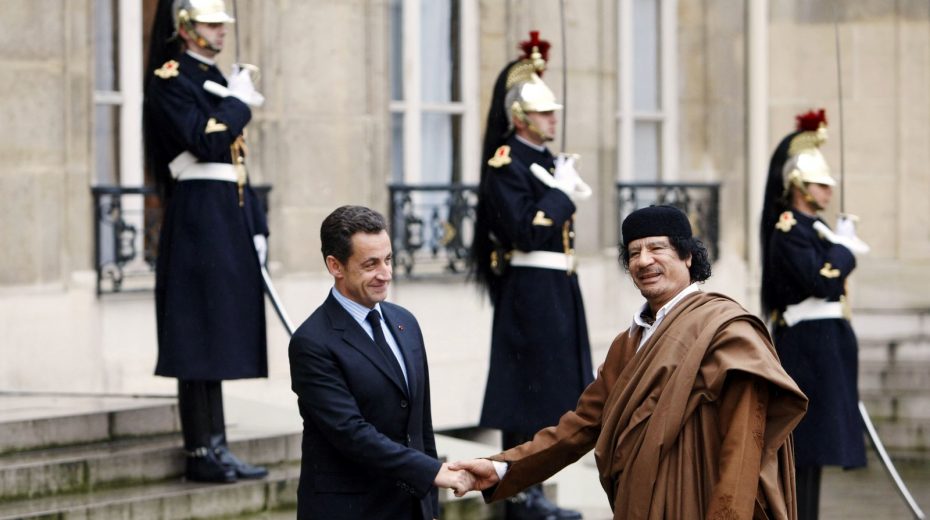
By DE LAUZUN
Former French President Nicolas Sarkozy has just been sentenced to five years in prison for “criminal conspiracy” in connection with his murky dealings with Libyan dictator Muammar Gaddafi.
The verdict, a first for someone who once held the nation’s highest office, has stunned Sarkozy’s circle, sparking widespread criticism regarding the alleged political motivation behind this unusual legal ruling.
The presiding judge emphasized on Thursday, September 25th, that the accusations were “exceptionally serious” and “likely to undermine public confidence.” The Paris court imposed a five-year immediate prison term on Nicolas Sarkozy for “allowing his closest associates” to engage with Muammar Gaddafi’s Libya to fund his successful 2007 presidential bid.
His associates included his former chief of staff Claude Guéant, longtime friend and subsequent interior minister Brice Hortefeux, and Lebanese businessman Ziad Takieddine, who passed away shortly before the verdict. The court found that their intention was to “obtain or attempt to obtain financial support in Libya with a view to securing campaign funding.”
Claude Guéant was sentenced to six years, while Brice Hortefeux received a two-year sentence. They allegedly communicated directly with Libyan officials and reported back secretly to Sarkozy. The court concluded that Nicolas Sarkozy “could not have been unaware” of their activities and the purpose of these discussions.
However, an audit of campaign finances revealed no evidence of Libyan funds, implying that the alleged efforts failed. Consequently, Sarkozy was acquitted of charges related to corruption and illegal campaign financing, although the possibility of untraceable cash contributions “cannot be ruled out.”
On the Right, the verdict was met with dismay. Henri Guaino, sovereigntist and former Sarkozy adviser, described it as a judicial coup d’état. While stopping short of labeling it a “political trial,” he warned of a dangerous trend where the judiciary may override political authority.
The court’s partiality seems clear to many. Other presidents, such as François Hollande and Emmanuel Macron, faced scandals—fake asset declarations or unaccounted fortunes—yet these did not trouble the judicial system. This ruling marks the first time a French president has been sentenced to prison with immediate enforcement. The only concession was a deferred committal order, allowing Sarkozy to avoid arrest in court. Nevertheless, his reputation has been irreversibly damaged. The judgment, imbued with the Left’s idealism, disregards that a head of state, regardless of opinion, is subject to the same legal standards as any citizen.
MEP François-Xavier Bellamy (Les Républicains) denounced the immediate enforcement as excessive, questioning why the judges feared waiting for an appeals verdict. Highlighting the frequent release of serious offenders, he argued that the public would see through the decision’s implications. The Rassemblement National, recalling Marine Le Pen’s earlier conviction, expressed outrage over both Sarkozy’s sentence and its provisional enforcement, which compromises the appeal process similarly to Le Pen’s case.
Setting aside these justified critiques, it is crucial to consider Sarkozy’s role and responsibility in his present circumstances.
Regarding the core issue—his dealings with Libya—it’s important not to let questions about the judges’ ideological inclinations obscure Sarkozy’s significant accountability for the Libyan conflict and the subsequent regional instability that continues to affect us.
Legally speaking, the French judiciary’s current capacity to issue such verdicts in 2025 – influenced by the Left – also stems from Sarkozy’s earlier political failures to control Left-wing dominance.
When elected in 2007 after a twelve-year Chirac presidency, Sarkozy promised a ‘break with the past.’ He energized the right-wing electorate, diverting support from the National Front. Yet once in office, his promised tough stance was replaced by bland calls for ‘openness,’ allowing many Left-wing figures to join the government. The anticipated crackdown on the Left and its judicial influence never materialized.
Sarkozy exploited the right wing electorally before ultimately betraying and, to some extent, undermining it. Perhaps his gravest misstep was his ambiguous involvement in the downfall of his prime minister, François Fillon, the conservative 2017 presidential candidate who was brought down by comparatively minor corruption accusations—his wife’s parliamentary assistant role and expensive suits received as gifts—maneuvered by political adversaries. Sarkozy offered no support and may have even played a role in hastening Fillon’s demise.
Since Emmanuel Macron’s 2017 election, Sarkozy has maintained a somewhat cordial relationship with him, perhaps expecting protection. However, he should have realized that Macron, coming from the Left and willing to compromise to retain power, offers no such guarantees.
Now, Sarkozy faces the consequences of his political timidity. Considering the harm wrought by his concessions, this penalty might still be insufficient.
Original article: europeanconservative.com





